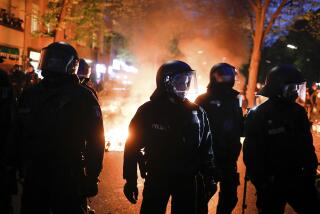E. Germans Hint at Softening of Rigid Policies
- Share via
BONN — In hints of a shift in the official response to demonstrators in East Germany, local Communist leaders have opened talks with pro-reform activists in the city of Dresden, and talks are expected in Leipzig, officials said Tuesday.
At the same time, activists announced that police in the past two days had released 500 members of the opposition detained in violent protests in Dresden during ceremonies marking the 40th anniversary of the East German state. Officials have said all demonstrators not charged in the violence will be released.
“It’s a hopeful sign, but still far too early to talk about a turning point,” one church source in Dresden cautioned.
The increased indications of local willingness to talk, which came after about 50,000 demonstrators were allowed to protest peacefully in Leipzig on Monday, stood in sharp contrast to the continued attack on dissenters maintained by the government of East German leader Erich Honecker.
Official state media ran long commentaries denouncing the unrest and accusing protesters of being “thugs” who have “lengthy criminal backgrounds.” Most demonstrations in the last week were broken up by police wielding truncheons, whips and prods and commanding leashed guard dogs.
Honecker, 77, has given no indication he is softening his hard line. In a meeting Monday with the Chinese vice premier, he alleged that Western “imperialists” threaten his country and appeared willing to crush dissent, if necessary.
Dresden Mayor Wolfgang Berghofer first met with about 20 pro-reform activists in unprecedented talks Monday and has scheduled another meeting for next week, in an apparent effort to avoid further violence.
Topics included in the discussions were election reforms, travel restrictions on East German citizens and release of those arrested during the earlier demonstrations, according to Christof Ziemer, the superintendent of Dresden’s Lutheran Church.
In Leipzig, East Germany’s second-largest city, talks between Communist leaders and reformists also are set to begin, although no timetable has been set, according to the West German television network ZDF.
Hans-Juergen Sievers, a Lutheran pastor in Leipzig, said in a West German radio interview that he believed the decision by the Leipzig officials to work for dialogue “was certainly not made alone, without discussions with others.”
But he said it was too soon to tell whether that might signal a change in the course pursued by East Berlin.
Earlier this week, Leipzig’s Communist Party chief, Roland Woetzel, and his top aide were among those who signed a declaration saying they would work to achieve a dialogue between the East German government and opposition groups. They agreed that talks similar to those held in Dresden were needed.
On Monday night, the weekly prayer meeting at Nikolai Church in Leipzig attracted tens of thousands of young people who marched through the city calling on the government to bring in more liberal political and economic conditions.
The West German television network, quoting key Lutheran Church sources, also reported Tuesday that talks about the spreading East German unrest “had begun with central offices” in East Berlin. It did not elaborate and Manfred Stolpe, deputy director of the Lutheran Church Federation, denied the report.
However, Stolpe said “working groups” did exist to discuss the current situation, adding: “We’re not sleeping.”
In East Berlin, the Interior Ministry released the first official accounting of those injured nationwide in the last week of unrest. A total of 106 policemen and 46 “hooligans” were hurt, it said. Protestant church officials have estimated the number of those beaten in the demonstrations to be at least 600.
An official report released by the East German government said the demonstrators over the weekend “threw stones, bottles, firebombs and hit out ruthlessly with steel bars and other objects.”
Also Tuesday, West German Chancellor Helmut Kohl declared in Frankfurt that his government would support East Germans who remained and worked for reform.
Opening the Frankfurt Book Fair, Kohl said that although he understood the motivations of those thousands of East Germans who have actually fled their country for West Germany in recent weeks, West Germans were sympathetic to those who stayed.
In Washington, the Bush Administration criticized East Germany for its use of force to break up the demonstrations.
More to Read
Sign up for Essential California
The most important California stories and recommendations in your inbox every morning.
You may occasionally receive promotional content from the Los Angeles Times.













